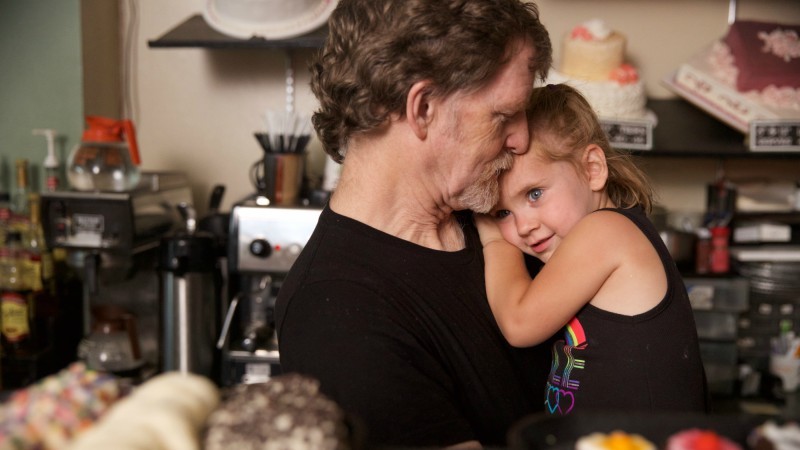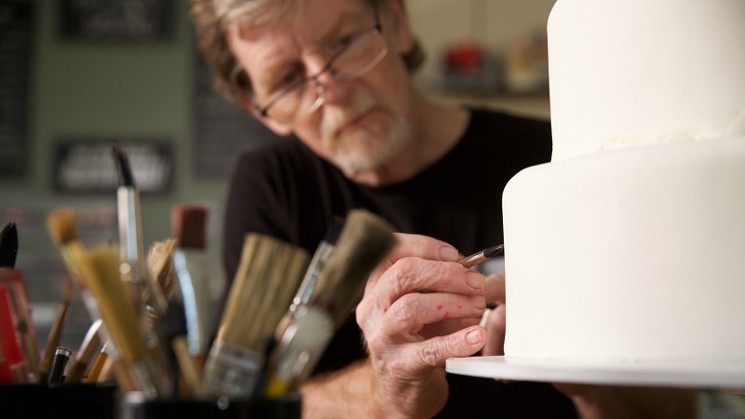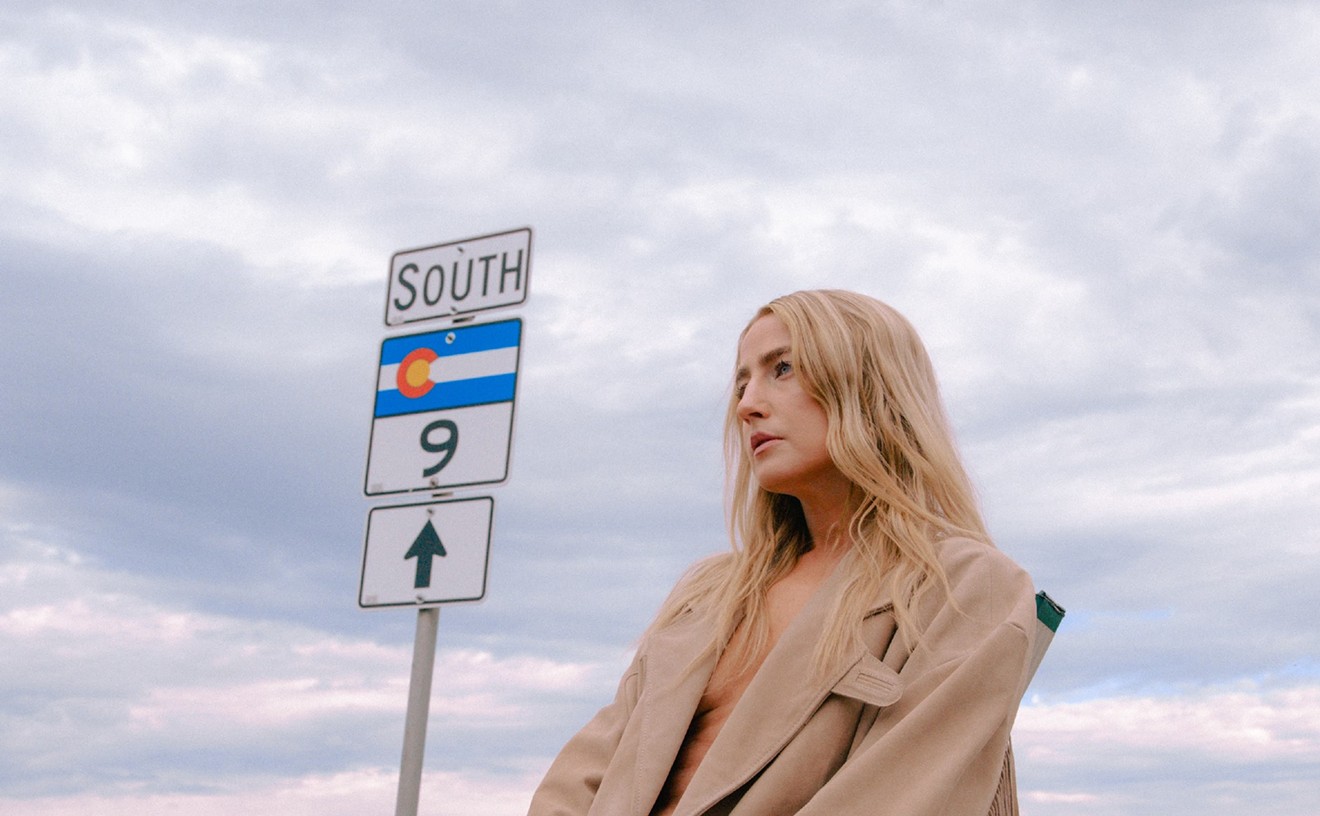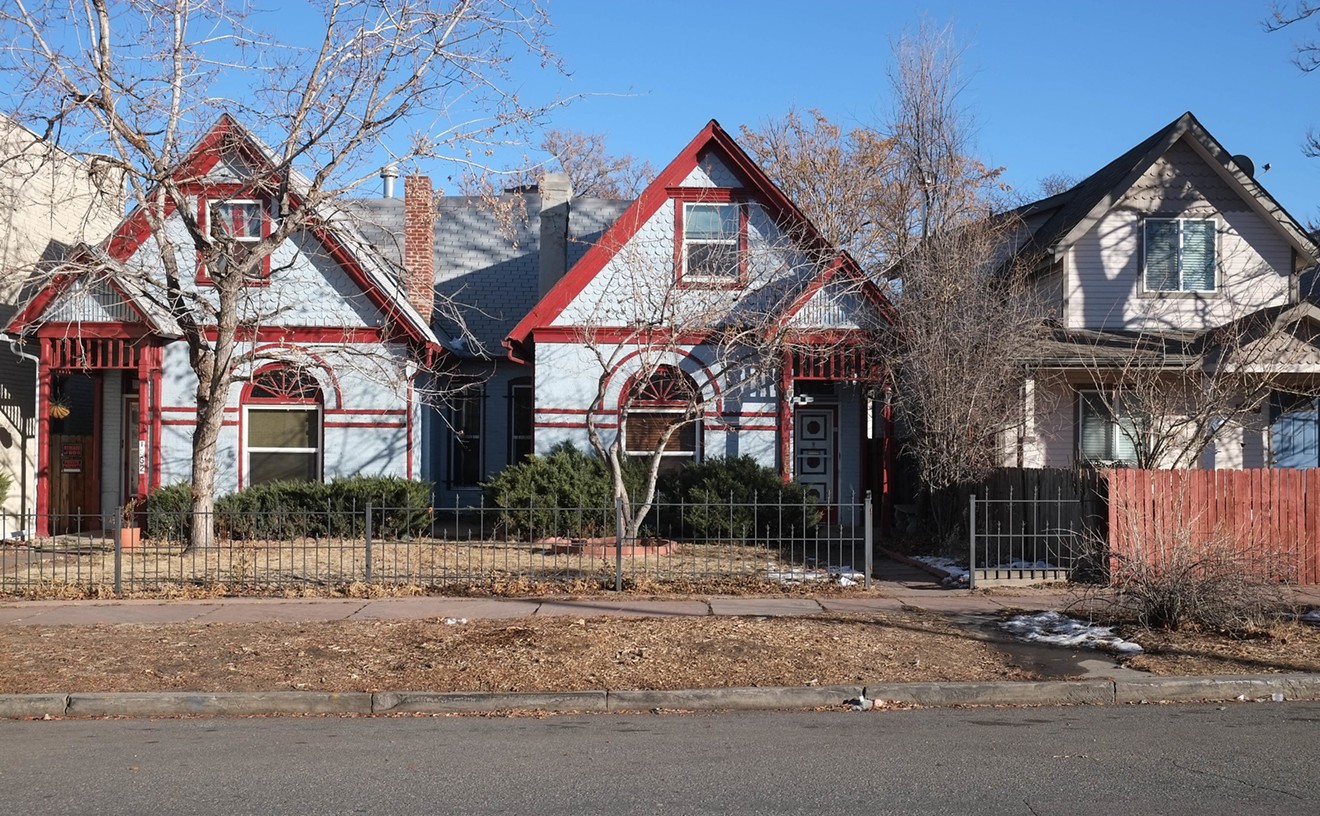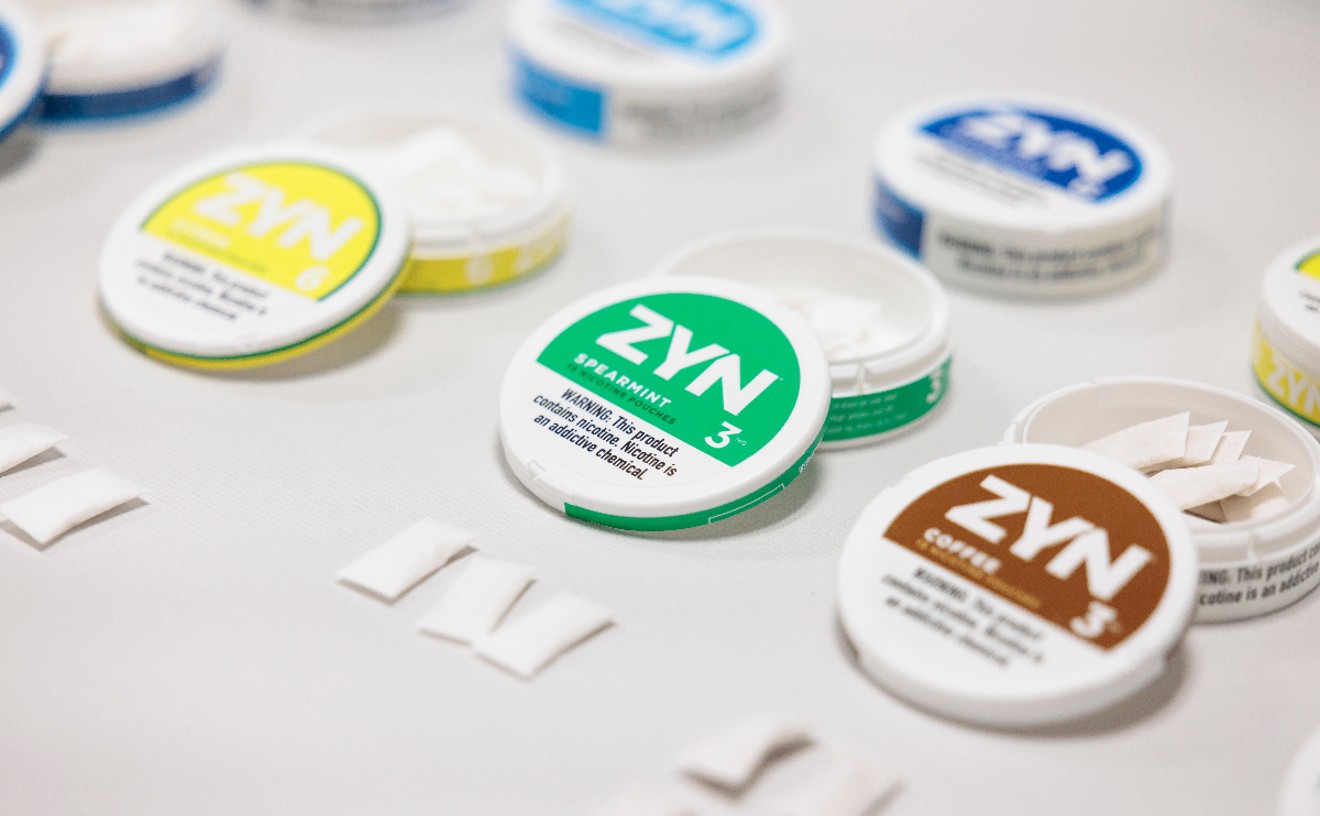A lawsuit filed this week in U.S. District Court argues that a new State of Colorado complaint about Masterpiece Cakeshop, whose owner, Jack Phillips, won a U.S. Supreme Court ruling in June over his 2012 refusal to make a wedding cake for a gay couple because of his Christian views, is essentially harassment that could have dire consequences.
"It is now clear that Colorado will not rest until Phililps either closes Masterpiece Cakeshop or agrees to violate his religious beliefs," the suit maintains, adding, "The state's continuing efforts to target Phillips do not just violate the Constitution; they cross the line into bad faith. This Court should put a stop to Colorado's unconstitutional bullying."
The complaint is accessible below, along with a discrimination charge prompted by Phillips's refusal, based on religious grounds, to make what's described as "a cake designed with a blue exterior and pink interior [to] visually depict and celebrate a gender transition."
Also linked here is a determination of probable cause from the Colorado Civil Rights Commission, the same body that ruled Phillips had discriminated against the aforementioned couple, Charlie Craig and David Mullins, back in June 2014 — and which retiring Supreme Court Justice Anthony Kennedy castigated in his majority opinion. "The Colorado Civil Rights Commission’s consideration of this case was inconsistent with the State’s obligation of religious neutrality," Kennedy wrote.
The many defendants in the latest lawsuit include Governor John Hickenlooper, who said at a public appearance yesterday, "Certainly I can't imagine we have a vendetta against anyone. But it seems to me you shouldn't be able to withhold your services or products from someone else based on their religion."
Also singled out is Aubrey Elenis, director of the Colorado Civil Rights Commission. In response to outreach from Westword, a spokesperson for the state Department of Regulatory Agencies (DORA) provided the following statement: "The Colorado Civil Rights Division or Colorado Civil Rights Commission is unable to provide comment regarding pending or active litigation. By law, CCRD and CCRC cannot disclose whether or not a charge has been filed with the office, and subsequent discussions regarding cases are confidential. However, because parties who are involved in cases are at liberty to and may choose to share their case information, there may be media or other public reports regarding cases that the CCRD and CCRC is, by statute, unable to verify or disclose."
Thus far, we haven't received a reply to our inquiry to attorney Autumn Scardino, the person who filed the discrimination charge last year in regard to the gender-transition-cake request. However, a passage from the Scardino Law website cited in the lawsuit states: "Our lawyers are proud to stand up for the rights of members of the LGBT community who have been discriminated against or harassed in the workplace. We take great pride in taking on employers who discriminate against lesbian, gay, bisexual and transgender people and serving them their just desserts. This extends not only to wrongful termination and other forms of discrimination, but to hiring discrimination and retaliation as well. Let us help you seek justice."
The suit points out that Scardino's discrimination charge was filed on June 26, 2017, the same day the U.S. Supreme Court agreed to hear the original Masterpiece Cakeshop case. Moreover, the determination of probable cause is dated June 28, 2018, just over three weeks after the Supremes sided with Phillips.
In the view of Jim Campbell, senior counsel for the Alliance Defending Freedom, the national legal and advocacy firm that backs Phillips and filed both Masterpiece Cakeshop complaints, this timing isn't coincidental.
The charge came down "a mere 24 days after the Supreme Court ruled in Jack's favor and said the state acted in hostility to his religious beliefs faith," Campbell says. "So it's interesting that the state has now renewed its crusade against Jack."
Critics of Phillips see him as a bigot who's using the Bible as an excuse to discriminate. The portrait Campbell paints is far more benign.
"Jack serves everyone," he insists. "He always has and always will. What he can't do is create custom cakes that express messages and celebrate events in conflict with his faith. So when this new request came in, the Cakeshop made it clear that they were happy to serve in different ways — happy to make a different cake, happy to sell other products in the shop. But it couldn't create a cake with that message, and it's our position that the Constitution protects their right to say that."
In June, Campbell goes on, "one of the primary things the court pointed to in its decision was that it was treating Jack differently, by allowing other cake artists to decline cakes with messages they deemed offensive. That's evidence of unequal treatment — and this new circumstance shows they're continuing to single him out and treat him differently."
After the June decision, Paula Greisen, one of the attorneys representing Craig and Mullins, told us that, in her view, the ruling was extremely narrow and didn't establish sweeping precedent — and plenty of other legal experts echoed her views. Campbell feels otherwise.
"People who say that are disregarding key parts of the Supreme Court's decision — especially when they talked about the hostility to Jack's faith being shown by unequal treatment," he maintains. "And now the state is doubling down on the unequal treatment. It's continuing to allow other cake artists to decline to make cakes they find offensive, but when Jack does it, he's punished."
This scenario is especially troublesome, in Campbell's view, given what Phillips has lived through over more than half a decade.
"Jack just spent a grueling six years defending his freedom," he emphasizes. "It turned his life upside down. He endured death threats, harassing phone calls and vandalism, with people throwing rocks through his window. It got to the point where his wife was afraid to set foot in the Cakeshop. Then the state ruled against him, and he was ordered either to create cakes celebrating events in conflict with his faith or to stop making wedding cakes. So he stopped, and because of that, he lost 40 percent of his income and most of his employees. And even after the Supreme Court ruled in his favor, ramping back up wasn't something he could do overnight. It isn't really feasible for him to do that before the end of this wedding season — so he continues to suffer the loss of that business. It's something that can't be recovered with the snap of a finger."
"We're hopeful the federal court will step in and quickly put an end to this, or the state will reconsider what it's doing and decide not to pursue these additional attempts to harass him," Campbell continues. "But if it requires us to defend Jack for years and go all the way back to the U.S. Supreme Court, we're prepared to do that."
Click to read Masterpiece Cakeshop et. al. v. Aubrey Elenis et. al., the discrimination charge and the probable-cause determination.
[
{
"name": "Air - MediumRectangle - Inline Content - Mobile Display Size",
"component": "12017618",
"insertPoint": "2",
"requiredCountToDisplay": "2",
"watchElement": ".fdn-content-body",
"astAdList": [
{
"adType": "rectangle",
"displayTargets": "mobile"
}
]
},{
"name": "Editor Picks",
"component": "17242653",
"insertPoint": "4",
"requiredCountToDisplay": "1",
"watchElement": ".fdn-content-body",
"astAdList": [
{
"adType": "rectangle",
"displayTargets": "desktop|tablet"
},{
"adType": "rectangle",
"displayTargets": "desktop|tablet|mobile"
}
]
},{
"name": "Inline Links",
"component": "18838239",
"insertPoint": "8th",
"startingPoint": 8,
"requiredCountToDisplay": "7",
"maxInsertions": 25
},{
"name": "Air - MediumRectangle - Combo - Inline Content",
"component": "17261320",
"insertPoint": "8th",
"startingPoint": 8,
"requiredCountToDisplay": "7",
"maxInsertions": 25,
"watchElement": ".fdn-content-body",
"astAdList": [
{
"adType": "rectangle",
"displayTargets": "desktop|tablet"
},{
"adType": "rectangle",
"displayTargets": "desktop|tablet|mobile"
}
]
},{
"name": "Inline Links",
"component": "18838239",
"insertPoint": "8th",
"startingPoint": 12,
"requiredCountToDisplay": "11",
"maxInsertions": 25
},{
"name": "Air - Leaderboard Tower - Combo - Inline Content",
"component": "17261321",
"insertPoint": "8th",
"startingPoint": 12,
"requiredCountToDisplay": "11",
"maxInsertions": 25,
"watchElement": ".fdn-content-body",
"astAdList": [
{
"adType": "leaderboardInlineContent",
"displayTargets": "desktop|tablet"
},{
"adType": "tower",
"displayTargets": "mobile"
}
]
}
]

